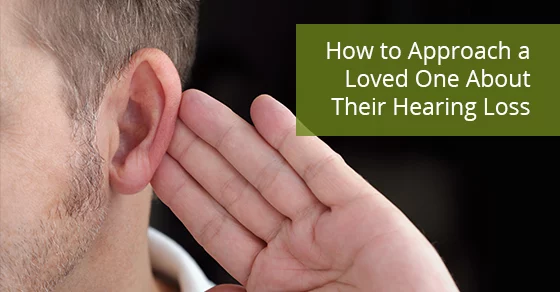How to Approach a Loved One About Their Hearing Loss
Posted by Living Sounds

Hearing loss is not easy for anyone. It can be a sensitive and challenging issue to discuss with someone. After all you don’t want to risk offending them or making them feel uncomfortable. However these challenges shouldn’t prevent you from approaching someone you love with hearing loss. Communication mishaps ranging from misunderstandings and repetition can be awkward. But once you get past that, you can have a conversation with them about their hearing health and discuss the next steps — such as getting a hearing aid — to help restore their quality of life.
When to Talk About Hearing Loss
Hearing loss affects everyone, not just those who are experiencing it. In fact, the person with hearing loss is often the last one to know. Coming to terms with the fact that you have lost a part of yourself, like your hearing, is very difficult. Experts say it often takes up to 10 years to accept. You can help your loved one move forward by starting the conversation early. Approaching the topic gently and patiently can help prevent them from becoming defensive and/or shutting down. If you approach the subject with love and concern for their well being, it can help your loved one take the first steps on their journey to better hearing.
A good way to open the conversation is to emphasize the value of your relationship. Talk about how hearing loss is affecting your ability to connect meaningfully with each other. It’s equally important to reassure and advocate for them at every step of the way. This starts when they book their hearing assessment through to having their hearing aid fit in their ears. Many people who use hearing aids note that they finally made the transition because their loved ones persistently advocated for their best interest.
How Not to Talk About Hearing Loss
Approach conversations about hearing loss with care. It’s just as important to make sure that you make a meaningful argument to your loved one and avoid being negative. Hearing loss can be scary. Try to avoid using negative phrases such as, “you can’t hear anything I say” or “I think you’re going deaf”. Avoid getting frustrated when your loved one does not immediately respond to your suggestions for help. It might make logical sense to you that they should get help right away, but not to them. Also try not to simply raise your voice or yell at them when they cannot hear you.
Another barrier to someone starting their hearing health journey is ongoing enabling by their loved ones. It may be easier to adjust your communication style in the short-term, but it only masks the reality of their hearing loss. Instead, try to avoid repeating yourself over and over. And resist doing this for them when they are communicating with others. If you stop enabling them, they will begin to understand why they need to seek help from a hearing healthcare professional.
Help a Loved One Get a Hearing Aid
The first step to getting a loved one fitted for a hearing aid is booking a hearing assessment. You can help them set an appointment at one of our hearing aid clinics. There, they will undergo a series of tests with an Audiologist or Hearing Aid Practitioner to determine the type and degree of their hearing loss. Your presence will be reassuring. Your loved one will finally understand their hearing loss, the various types of hearing aids available, and what solution is best suited for their lifestyle.
Advocate for Smart Hearing Aids
It’s not enough to help your loved one get just any hearing aid. You want the optimal solution for the people you love. This should include a hearing aid that provides the best hearing experience for their lifestyle and has technology that they can count on. Today, modern hearing aids don’t simply allow the hearing-impaired to hear the world around them. The best devices deliver customizable listening experiences based on their environment and what they want to hear. Feature-rich listening means ensuring that they get the best experience possible, whether they’re engaged in conversations, working, or watching TV. Smart hearing aids are built to detect various listening environments and adjust volume and noise cancellation settings to ensure the utmost clarity and engagement.
How to Communicate with a Loved One Experiencing Hearing Loss
Avoid raising your voice or yelling at them. Instead, restate or reword what you are saying in simpler terms if misunderstanding persists after a few tries. Consider the environment, and pay attention to your surroundings: maintaining a conversation in a noisy restaurant is challenging. Try to position yourself in a way that the noise is behind you, rather than the same direction as your speech. Consider the lighting too, as dimly lit rooms reduce the facial cues and any chance of lip reading.
Hearing aids are not designed to magically cure hearing loss, and there is a learning curve to their regular use and function. You should not expect that, as soon as a loved one is diagnosed with hearing loss and fit with hearing aids, all communication problems will vanish overnight. The best way to address gaps in the use of hearing aids is practicing effective communication strategies — while remembering to exercise patience and empathy in the process. Remember that communication is hard work for someone wearing a hearing aid, so be patient if you are not heard or understood right away, especially in the beginning.
To learn more about approaching a loved one about their hearing loss, visit one of our Living Sounds clinics or contact us here.

